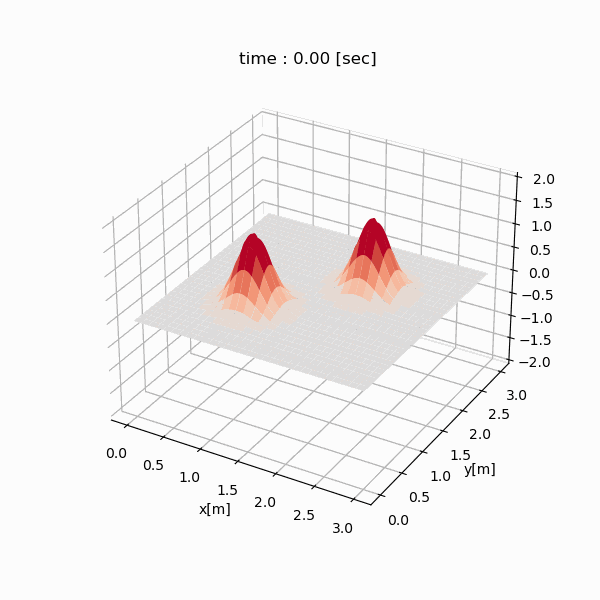Example: Wave Simulation
Objective
We will simulate the wave propagation on a 3 m 3 m two-dimensional plane.
Physics
Governing Equation
Variable |
Description |
|---|---|
Amplitude |
|
Time [s] |
|
x coordinate [m] |
|
y coordinate [m] |
Constant |
Description |
Value |
|---|---|---|
Propagation Speed |
1.0 [m/sec] |
Boundary Conditions
The amplitude at all boundaries is constantly 0.
Program
import nlcpy as vp
from matplotlib import pyplot as plt
from matplotlib import animation
LX = 3
LY = 3
NX = 300
NY = 300
DT = .005
MT = 3
KP = .02
C = 1.
DX = LX / (NX + 1)
DY = LY / (NY + 1)
MX = NX + 2
MY = NY + 2
DTYPE = 'float32'
XX, YY = vp.meshgrid(
vp.linspace(0, LX, MX),
vp.linspace(0, LY, MY)
)
SURFACE = None
def gaussian(x, y, mu, sigma):
distribution = 1 / vp.sqrt(2 * vp.pi * sigma * sigma) * \
vp.exp(-(x - mu) ** 2 / (2 * sigma * sigma)) * \
vp.exp(-(y - mu) ** 2 / (2 * sigma * sigma))
return distribution / vp.absolute(distribution.max())
def initialize(grid):
grid[...] = 0
grid[...] += gaussian(XX, YY, 2 * LX / 3, .2) * 1.5
grid[...] += gaussian(XX, YY, 1 * LX / 3, .2) * 1.5
def create_stencil_kernel(g_tm1, g_t, g_tp1, coef):
dg_tm1, dg_t, dg_tp1 = vp.sca.create_descriptor((g_tm1, g_t, g_tp1))
desc = (dg_t[0, 0] * coef[0] -
dg_tm1[0, 0] * coef[1] +
(dg_t[0, -1] + dg_t[0, 1]) * coef[2] +
(dg_t[-1, 0] + dg_t[1, 0]) * coef[3])
return vp.sca.create_kernel(desc, desc_o=dg_tp1[0, 0])
def wave_equation():
grid0 = vp.sca.create_optimized_array((MY, MX), dtype=DTYPE)
grid1 = vp.sca.create_optimized_array((MY, MX), dtype=DTYPE)
grid2 = vp.sca.create_optimized_array((MY, MX), dtype=DTYPE)
coef = [
(1 - (C * C * DT * DT) / (DX * DX) -
(C * C * DT * DT) / (DY * DY)) * 2,
1,
(C * C * DT * DT) / (DX * DX),
(C * C * DT * DT) / (DY * DY)
]
print("initializing grid...", end="", flush=True)
initialize(grid0)
grid1[...] = grid0[...]
grid2[...] = grid0[...]
print("done", flush=True)
print("creating stencil kernel...", end="", flush=True)
kernels = []
kernels.append(create_stencil_kernel(grid0, grid1, grid2, coef))
kernels.append(create_stencil_kernel(grid1, grid2, grid0, coef))
kernels.append(create_stencil_kernel(grid2, grid0, grid1, coef))
print("done", flush=True)
fig = plt.figure(figsize=(6, 6))
ax = fig.add_subplot(111, projection='3d')
grid_for_plot = [grid0.get(), ]
print("computing difference method...", end="", flush=True)
for i in range(int(MT/DT)):
grid_current = kernels[i % 3].execute()
if i % int(KP/DT) == 0:
grid_for_plot.append(grid_current.get())
print("done", flush=True)
def animate(i):
global SURFACE
if SURFACE:
ax.collections.remove(SURFACE)
SURFACE = ax.plot_surface(
XX, YY, grid_for_plot[i], rstride=10, cstride=10,
cmap=plt.cm.coolwarm, vmax=1, vmin=-1)
ax.set_title('time : {:2.2f} [sec]'.format(i * KP))
def animate_init():
ax.set_xlabel("x[m]")
ax.set_ylabel("y[m]")
ax.set_zlim(-2, 2)
print("creating animation...", end="", flush=True)
animation.FuncAnimation(
fig,
animate,
frames=int(MT / KP + 1),
interval=50,
repeat=False,
init_func=animate_init
).save(
"wave_simulation.gif",
writer='pillow',
)
print("done", flush=True)
for kern in kernels:
vp.sca.destroy_kernel(kern)
if __name__ == "__main__":
wave_equation()
Simulation Result
